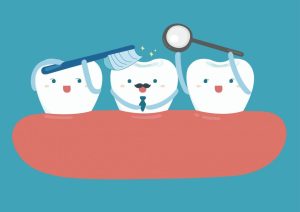It’s not uncommon to experience sudden jaw pain, and if you have wisdom teeth, they could be the underlying culprit. Understanding how these molars can impact your jaw health is necessary for addressing discomfort effectively. In this article, you will learn about the signs that indicate your wisdom teeth might be causing your jaw pain, enabling you to take informed steps toward relief and proper dental care.
Understanding Wisdom Teeth
The wisdom teeth, also known as third molars, typically emerge in late adolescence or early adulthood. These teeth were once necessary for our ancestors, who had diets requiring more chewing power. However, today, many people’s jaws are not large enough to accommodate them, leading to various dental issues. Understanding how wisdom teeth function and the potential problems they may cause is key to maintaining your oral health.
What Are Wisdom Teeth?
Any discussion about dental health involves wisdom teeth, as these are the last set of molars that usually emerge between the ages of 17 and 25. Often referred to as third molars, they can be a source of discomfort if there isn’t enough space in your mouth for them to grow properly.
Common Problems Associated with Wisdom Teeth
Behind their late arrival, wisdom teeth can cause several issues, including impaction, crowding, and infection. Many people experience pain or discomfort as these teeth try to emerge, sometimes leading to swollen gums or even damage to adjacent teeth.
Even when wisdom teeth come in correctly, they can still pose problems like difficulty in adequately cleaning the back of your mouth. This can increase the risk of cavities and gum disease. Additionally, impacted wisdom teeth can lead to severe pain, swelling, and even cyst formation if left untreated. Being vigilant about your dental health and consulting your dentist regularly can help you mitigate these risks.
Signs of Wisdom Teeth Issues
One of the main challenges with wisdom teeth is recognizing when they might be causing problems. As they emerge, you may experience various signs indicating that your wisdom teeth may require attention. Keeping an eye out for these symptoms can help you address any potential issues before they escalate into more significant complications.
Painful Symptoms to Monitor
Signs of discomfort can manifest as persistent jaw pain, sensitivity, or swelling around your gums. You might also notice difficulty while chewing or a feeling of pressure in the back of your mouth. If you experience these symptoms, it’s imperative to assess your situation with your dental care professional.
Other Indications of Complications
Other signs that may suggest complications from your wisdom teeth include bad breath, swollen lymph nodes, or a strange taste in your mouth. These symptoms could indicate an infection or impaction of your wisdom teeth, which goes beyond mere discomfort and requires immediate attention.
Teeth that are impacted can push against adjacent teeth, leading to misalignment and further complications. You might also experience fever or a more intense swelling that could signify a dental abscess. If you observe any of these indications, consulting a dentist can help ensure your oral health is maintained and prevent exacerbation of any existing issues.
Jaw Pain Explained
Some individuals experience jaw pain from various sources, leading to discomfort that can interfere with daily activities. This pain may arise from issues related to muscles, nerves, or the temporomandibular joint (TMJ). Understanding the nuances of jaw pain is crucial for identifying its underlying causes and seeking appropriate treatment, particularly if it impacts your quality of life.
Causes of Sudden Jaw Pain
Along with possible origins such as dental problems, stress, or injury, sudden jaw pain can occur due to improper alignment or grinding your teeth. If you notice this discomfort, investigating the specific triggers can provide insight into how to alleviate your symptoms and restore normal function.
The Connection Between Wisdom Teeth and Jaw Pain
Behind many instances of jaw pain lies the impact of wisdom teeth, particularly when they become impacted or misaligned. As they attempt to emerge, they can put pressure on surrounding teeth and tissues, leading to inflammation and pain that radiates throughout your jaw. Understanding this connection is key to addressing your discomfort effectively.
The role of wisdom teeth in causing jaw pain cannot be overstated. When wisdom teeth do not have adequate space to grow or follow an incorrect path of eruption, they can create pressure against your jaw, resulting in pain. The resulting inflammation may affect surrounding structures, amplifying discomfort in your jaw. If you are experiencing sudden jaw pain and suspect it may be linked to your wisdom teeth, consider discussing your symptoms with a dental professional to explore potential treatment options.
When to Seek Professional Help
Now is the time to consult with a dental professional if you experience persistent or worsening jaw pain, especially if it’s accompanied by swelling, fever, or difficulty opening your mouth. Wisdom teeth can lead to complications, and timely intervention can help in preventing further issues such as infections or misalignment. Early diagnosis and treatment can significantly alleviate pain and prevent complications, ensuring your oral health remains intact.
Signs That Require Immediate Attention
Professional assistance is necessary if you experience severe, radiating pain, swelling in your jaw or face, bleeding from the gums, or if you find it extremely difficult to open your mouth. These signs may indicate complications such as abscesses, impacted wisdom teeth, or infections that require immediate dental intervention to prevent further health issues.
Recommended Dental Consultations
Require regular dental consultations, especially if you notice changes in your jaw or wisdom teeth-related symptoms. Visiting your dentist for assessments enables them to monitor your oral health and provide guidance tailored to your specific needs. They can identify potential problems before they escalate and recommend appropriate treatment options, ensuring you maintain a healthy mouth and prevent unnecessary discomfort.
And, during these consultations, your dentist may perform X-rays to evaluate the position of your wisdom teeth, check for signs of impaction, and assess your overall oral health. Depending on their findings, they can advise you on whether your wisdom teeth should be removed, if any other treatment is needed, or how to manage any associated pain or discomfort effectively. Staying proactive with your dental health can make a significant difference in avoiding long-term complications.
Treatment Options for Impacted Wisdom Teeth
Despite the discomfort caused by impacted wisdom teeth, various treatment options are available to alleviate your pain and improve your oral health. Consulting with your dentist or oral surgeon is imperative to determine the best approach tailored to your individual needs. Treatment may range from non-invasive methods to surgical interventions depending on the severity of your condition.
Non-Surgical Treatments
For mild cases of impacted wisdom teeth, your dentist may recommend non-surgical treatments such as pain relievers, warm compresses, and saltwater rinses to reduce inflammation and discomfort. Additionally, maintaining good oral hygiene can help to mitigate any potential infections that may arise from your impacted teeth.
Surgical Considerations
Along with non-surgical treatments, surgical intervention may be necessary for more severe cases of impacted wisdom teeth that cause significant pain or complications. Your dentist will discuss the need for a surgical extraction, which entails removing the affected teeth to alleviate crowding and discomfort.
But before proceeding with surgery, you’ll likely undergo a thorough assessment, including X-rays, to evaluate the position of your wisdom teeth. Your oral surgeon will provide you with instructions on what to expect during the procedure, including anesthesia options and post-operative care. It’s important to discuss any concerns you may have, as understanding the process can reduce anxiety and lead to a smoother recovery. Ensuring that you are informed about the surgical procedure can help you feel more at ease when facing your treatment options.
Preventive Measures
Your journey to avoiding sudden jaw pain caused by wisdom teeth starts with effective preventive measures. Staying informed about the signs and symptoms is important for early intervention. Additionally, adopting good habits, such as maintaining oral health and scheduling regular dental check-ups, can significantly reduce the risk of complications associated with your wisdom teeth.
Maintaining Oral Health
Around proper oral hygiene practices are vital for keeping your mouth and teeth in optimal condition. Brushing twice a day, flossing daily, and using an antibacterial mouthwash can help eliminate food particles and bacteria that may lead to infections or gum disease, thus potentially preventing wisdom tooth-related jaw pain.
Regular Dental Check-Ups
Dental visits are important for monitoring your oral health and the position of your wisdom teeth. Regular check-ups enable your dentist to detect any emerging issues early, provide guidance on managing your wisdom teeth, and recommend treatment options if necessary.
The more frequently you visit your dentist for check-ups, the better equipped you will be to address any concerns related to your wisdom teeth. Your dentist can assess the alignment and development of your wisdom teeth through X-rays and regular examinations, helping you avoid complications like impacted teeth, infections, or sudden jaw pain. This proactive approach ensures you maintain optimal oral health and, if necessary, allows for timely removal of problematic wisdom teeth.
Following this, if you experience sudden jaw pain, it’s important to consider the possibility of impacted wisdom teeth as a contributing factor. Pay attention to accompanying signs such as swelling, difficulty opening your mouth, or discomfort while chewing. Consulting your dentist can help determine the cause and necessary treatments to alleviate your pain. Being proactive about your oral health can prevent complications and ensure your jaw remains comfortable and functional.
















